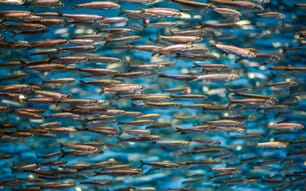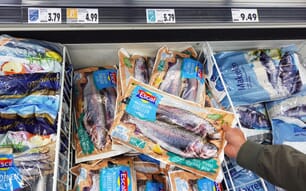This study examined the effect that OceanFeed™ Salmon has on the fatty acid content of salmon flesh by comparing fish that were fed a similar diet but with or without the seaweed-based feed ingredient.
This study is particularly interesting because salmon represent one of the greatest sources of omega-3 fatty acids in the western diet. Such fatty acids have important roles in heart and mental health; however, the levels of omega-3 in farmed salmon have dramatically declined in the last couple of years due to replacement of omega-3 rich fish oil with vegetable oils, which are cheaper, more sustainable and widely available.
The results of the study showed significantly higher levels of omega 3 fatty acids in the flesh of the fish that were fed seaweed when compared to the control group (no OceanFeed™). Flesh concentrations of the important omega-3 fatty acids eicosapentaenoic acid (EPA) and Docosahexaenoic acid (DHA) were 30 and 62 per cent higher, respectively, in the OceanFeed™-fed salmon. As a consequence, OceanFeed™ Salmon may help to maintain EPA and DHA levels in fish that are fed diets in which vegetable oil is the main source of lipid. In turn, this may help consumers obtain their recommended daily intake of these fatty acids.
Sea lice is an increasing problem. To control sea lice, the salmon industry is now using treatments with undesirable chemicals. Sea lice induce stress in the fish, decrease immune responses and adversely affect growth and performance. The mode of action by which sea lice infect salmon depends on a number of factors including release of prostaglandins, proteases and other immune supressing compounds. Together these compounds have many effects on salmon including reduced respiratory burst, lower macrophage activity, increased cell death, necrosis, decreased numbers of mucosal cells and down-regulation of immune genes such as interleukin IL-1ß and MHC-1. Based on recent data and customer feedback OceanFeed™ Salmon represents a potential sustainable in-feed solution to help control sea lice infestations.
Numerous peer-reviewed studies have shown that seaweed intake improves immunity in various animals. Interestingly, recent trials indicate that OceanFeed™ Salmon helps to reduce sea lice infestation by 40–70 per cent when included in the Salmon feed.
In vitro studies, using Atlantic salmon kidney cell lines suggest that the mechanism of action is at least in part due to the ability of OceanFeed™ to modulate the expression of immune-related genes, including Interleukin 12, a proteinaceous molecule that has an important role regulating the activity of immune cells.
Additional mechanisms of action include a notable increase in the mucus layer of the salmon, which may influence the ability of the parasite to attach to the salmon. In summary, OceanFeed™ salmon is beneficial for the salmon farmer, the salmon and the consumer and highlights the potentially pivotal role of seaweed in our ability to produce safe, high quality products in a sustainable manner.




